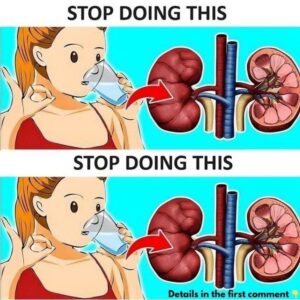
The kidneys are vital organs that play a crucial role in maintaining our overall health.
They filter waste, regulate blood pressure, produce essential hormones, and balance bodily fluids.However, certain daily habits can silently damage our kidneys, leading to long-term health problems.
In this comprehensive article, we’ll explore 15 of these habits and provide tips on how to protect your kidney health.
1. Overuse of Painkillers: A Hidden Threat to Kidney Health
Many people rely on painkillers, particularly non-steroidal anti-inflammatory drugs (NSAIDs), to manage everyday aches and pains.
While effective, overuse of these medications can place a significant burden on the kidneys.
The kidneys work hard to filter and detoxify these substances from the blood, and excessive use can lead to long-term damage
To protect your kidneys, limit the use of pain relievers and explore alternative pain management options.
2. Excessive Salt Consumption: A Recipe for Kidney Trouble
A diet high in salt can lead to high blood pressure, a major risk factor for kidney disease.
When the kidneys are overwhelmed by excess salt, they struggle to filter it out, leading to water retention, swelling, and increased pressure on the kidneys. Reducing your salt intake is crucial for maintaining healthy kidney function and preventing long-term damage.
3. Dehydration: A Silent Kidney Killer
Your kidneys rely on an adequate supply of water to function properly.
Dehydration can lead to a condition known as prerenal azotemia, which causes inflammation in the kidneys and can progress to acute kidney failure or chronic kidney disease. To support your kidneys, make sure you drink enough water each day to stay well-hydrated.
4. Lack of Sleep: Disrupting Kidney Function
Sleep is essential for regulating kidney function. During sleep, your body undergoes processes that help maintain a balanced sleep-wake cycle, which is critical for kidney health. Chronic sleep deprivation disrupts this cycle, increasing stress hormones that can cause kidney inflammation. Prioritize quality sleep to ensure your kidneys function optimally.
5. Consuming Too Much Sugar: A Risk Factor for Kidney Disease
Excessive sugar intake is a major contributor to obesity, high blood pressure, and type 2 diabetes—all of which are leading causes of kidney disease. Sugar is hidden in many foods, including desserts, snacks, and sugary drinks. Limiting your sugar consumption can reduce your risk of developing kidney-related health issues.
6. Alcohol Consumption: A Toxin to Your Kidneys
Regular and excessive alcohol consumption is strongly linked to an increased risk of chronic kidney disease. Alcohol can impair the kidneys’ ability to filter blood and remove waste, leading to long-term damage. Drinking in moderation and avoiding binge drinking can help protect your kidneys from harm.
7. Processed Foods: A Hidden Source of Kidney Stress
Processed foods are often high in sodium and phosphorus, both of which can be harmful to people with kidney disease. Additionally, processed foods are typically rich in unhealthy fats and carbohydrates, which can lead to inflammation in the kidneys. Limiting your intake of processed foods can help preserve kidney health.
8. Excessive Meat Consumption: A Strain on the Kidneys
Diets high in animal protein can produce excessive acid in the blood, which the kidneys must work hard to filter out. This can lead to a condition called acidosis, where the kidneys struggle to eliminate acid effectively. While protein is essential for health, it’s important to balance your diet with plenty of fruits and vegetables to reduce the strain on your kidneys.
9. Sedentary Lifestyle: Inactivity and Kidney Disease
A sedentary lifestyle is associated with an increased risk of kidney disease. Regular physical activity helps regulate blood pressure and improve glucose metabolism, both of which are important for kidney health. Incorporating more movement into your daily routine can help protect your kidneys from the negative effects of inactivity.
10. Smoking: A Major Risk Factor for Kidney Disease
Smoking is a well-known risk factor for many diseases, including kidney disease. The harmful chemicals in cigarettes damage blood vessels, reduce blood flow to the kidneys, and increase oxidative stress, all of which can impair kidney function. Quitting smoking is one of the best ways to protect your kidneys and overall health.
11. Use of Illegal Drugs: A Serious Threat to Kidney Function
Certain illegal drugs, such as cocaine, heroin, and ecstasy, pose significant risks to kidney health. Cocaine, for example, can cause blood vessels to constrict, leading to high blood pressure—a major cause of kidney damage. Heroin use can lead to kidney failure, especially when the drug is mixed with other harmful substances. Avoiding illegal drugs is essential for preserving kidney function.
12. Intense Physical Exercise: Balancing Activity and Kidney Health
While regular exercise is important for overall health, excessive or overly intense physical activity can lead to a condition called rhabdomyolysis. This condition causes muscle tissue to break down, releasing a protein called myoglobin into the bloodstream, which can damage the kidneys. To protect your kidneys, balance your exercise routine and avoid extreme physical exertion.
13. Soft Drinks: A Sugary Threat to Kidney Health
Soft drinks, particularly those high in sugar, can increase the risk of developing kidney stones. Even diet sodas, which contain artificial sweeteners, have been linked to impaired kidney function. The high levels of phosphoric acid in soft drinks can contribute to acidosis, leading to kidney damage. Limiting your intake of soft drinks is a smart choice for kidney health.
14. Excessive Caffeine: A Strain on the Kidneys
Excessive caffeine consumption can overwork the kidneys, as they must filter out the stimulant from the bloodstream. Caffeine also acts as a diuretic, leading to increased urine production and potential dehydration, which can harm the kidneys over time. Moderating your caffeine intake can help reduce the risk of kidney damage.
15. Holding in Urine: A Risky Habit
Holding in urine for too long puts unnecessary pressure on the bladder and kidneys. Over time, this can weaken the bladder, lead to more frequent urination, and increase the risk of urinary tract infections, which can spread to the kidneys. It’s important to respond to your body’s signals and not delay urination to maintain kidney and urinary health.
Your kidneys play an essential role in maintaining your overall well-being, but they can be vulnerable to damage from seemingly harmless daily habits. By being mindful of these 15 habits and making conscious changes, you can significantly reduce your risk of kidney disease and ensure your kidneys remain healthy and functional for years to come. Remember, small changes in your daily routine can have a big impact on your kidney health.



